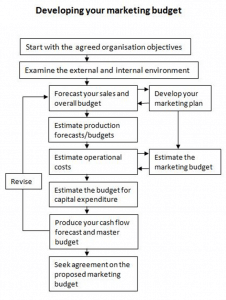
Developing Your Marketing Budget
Right now, many companies are involved in their business planning for the year ahead. What capacity have you allowed for your marketing activities next year? You’ll need to consider both the resource and the financials…
What is it for?
The marketing budget is usually an estimate of projected costs to market your products or services and may also include salaries for marketing personnel and the cost of office space.
- Your marketing budget should quantify the marketing plan, and therefore include appropriate actions, targets and expected results – and be allocated to relevant departments responsible for each aspect of the plan.
- The budget needs to pull together all your projected revenues and costs into one comprehensive document that can be adapted and revised throughout the year, as the marketing environment and economy changes.
- It can also be used as a powerful managerial tool to help you balance what needs to be spent against what can be afforded.
Why do we need one?
There are several reasons for identifying a marketing budget:
- It quantifies your marketing plan.
- It helps coordinate each element of the plan.
- It identifies the critical issues that need to drive the new strategy.
- It assigns responsibility to individuals/departments so that an assessment can be made on ROI (return on investment) and KPIs (key performance indicators):
-
- At the end of each marketing campaign.
- At the end of the year.
- During your marketing audit.
How do we do it?
As you’ll no doubt be aware, there are a few ways of constructing your budget:
- History – you follow last year’s budget – this assumes a rigorous evaluation of return, which you may find easier with some activities than others.
- Incremental – you follow last year’s budget with an adjustment for growth and inflation.
- Competitive parity – you match the spend of your competitors which assumes that they know best…
- Affordability – this approach can be vague and lacks flexibility. Unfortunately, it’s far too common and assumes that marketing is a cost, and therefore possibly even avoidable, when in reality it should be the engine that drives sales and market share.
- Percentage of sales or profit – a variation of the ‘affordable’ approach above, although it does suggest that marketing should be determined by sales, when it should be the reverse.
- Zero-based budgeting approach – this takes your marketing plan objectives, together with the planned activities to be tested and evaluated for return, and costs them out. As you understand what brings a return and what doesn’t, you boost your spend to drive sales constantly upward.
The chart below may assist with this process.

If you need help with any of this activity, then do get in touch via hello@alisonpagemarketing.co.uk.

